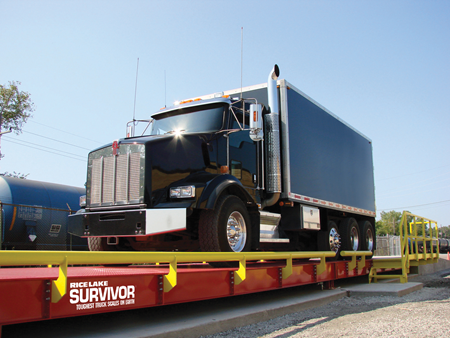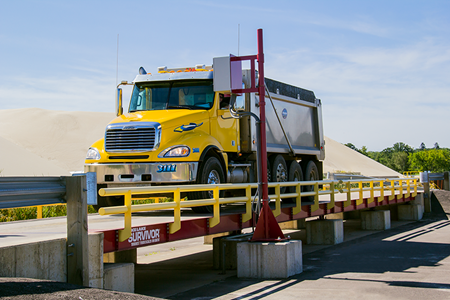Is the website displaying in the correct language? Please confirm or select a different language.
Your region has been set automatically. Please confirm or select a different region.

New Life for Steel
A Wisconsin scrap facility installed a SURVIVOR OTR to meet state regulations and accommodate heavy traffic.
When state regulations changed to prohibit split-weighing on Legal for Trade truck scales, and with a growing volume of scale traffic, Alter Metal Recycling in Eau Claire, Wisconsin, found themselves in need of a new solution.
They could no longer weigh trucks on an axle-by-axle basis and provide the sum as the truck’s total weight (split-weighing). While their existing pit-mounted mechanical truck scale could accommodate most vehicles, the business was expanding, and the increasing frequency of large commercial clients arriving in fully loaded semi-trucks demanded a longer scale.
Ken Barnhouse has been in the metal recycling business since 1997. Over that time, he has seen many changes in this evolving business, primarily in the equipment. Some of those changes increased efficiency and throughput, while others proved too unreliable to provide sustained advantages. But when Alter Metal Recycling chose an 80-foot SURVIVOR® OTR truck scale to replace its mechanical predecessor, it made Ken’s life easier.
He was working for a metal recycling business in Washington State at the time, and when he took the job as facility manager at Alter’s Eau Claire location, he was pleasantly surprised with the new equipment.
“We had just installed Rice Lake OTRs at the Washington State plant,” Ken remembers. “The ease of installation was one of the great selling points, and it works as it should all the time. There is very little maintenance and it interfaces very well with our software. We couldn’t ask for anything more.”
SURVIVOR OTRs are not only a favorite of Ken’s, but they have become a good solution for many Alter Metal Recycling facilities. The 45 regional locations of this privately held recycling company (one of the largest in America) are turning red with Rice Lake. “As the old scales complete their life span or new state regulations demand an update, we’re moving to SURVIVORs,” Ken explains. “Rice Lake is easy to work with and the product quality is excellent. It’s a proven solution. Accuracy and durability are very important in our business,” he adds. “I need to be able to tell someone that this is the weight and be confident when saying so. The equipment needs to be consistent, and the OTR is just that. In the three years we’ve had the scale, I haven’t had to replace a load cell but I do appreciate the easy access to load cell pockets. That will make any future maintenance quick and easy.”
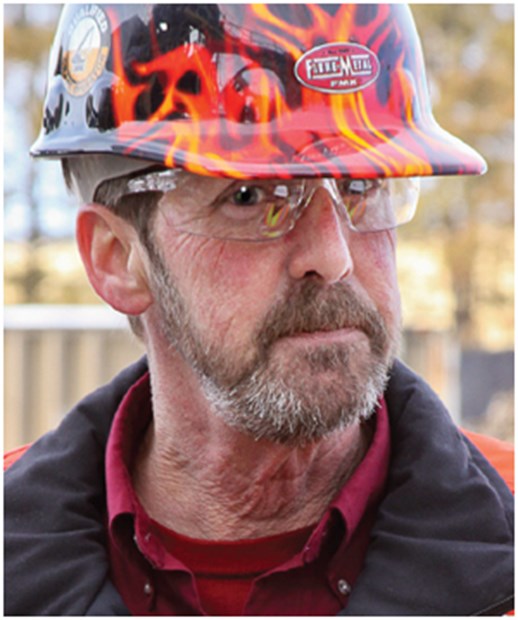
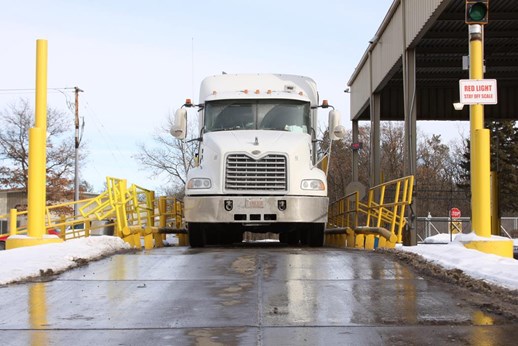
As a truck approaches the OTR, its contents are automatically scanned for potential radioactive material that could make it into the scrap stream. Seemingly harmless items such as vintage Cub Scout compasses and glow-in-the-dark watches are often identified and although they don’t pose any issues for safety or the environment, it does show how sensitive the detection equipment is. If the load passes the radiation test, the weight is captured by the office’s database software. A LaserLight® remote display mounted on either end of the scale (one for entering the facility and one for exiting) shows the driver their live weight. The metal is then offloaded in the yard, and a date with the 4,000 horsepower shredder awaits.
Scrap travels up the conveyor to the shredder where it is pulverized by 400-pound hammers mounted to an 80-inch diameter rotor. As it passes through the shredder, the scrap is sized per consumer specifications. The machine looks like a medieval torture device. Each hammer strike creates a sea of echoes between the mountains of scrap metal in the 26-acre yard.
The now-shredded autos, post-consumer goods (refrigerators, washers, swing sets, etc.) and a host of other input materials are sent through a magnetic separation system to prepare the steel and then move on to a variety of sophisticated separation equipment to remove other metals such as copper, aluminum and stainless steel.
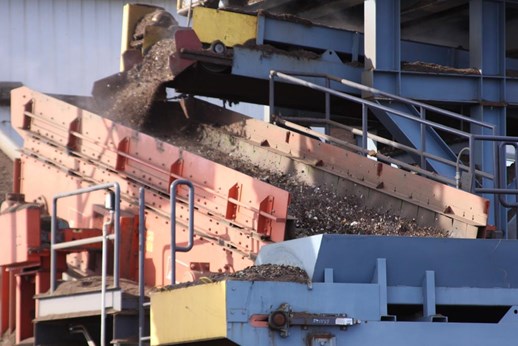
Running at a breakneck pace, the shredder can process 100 tons per hour and fills 80 rail cars per month (each rail car passes over Rice Lake load cells) in addition to outgoing truck loads. Once sorting and separating is complete, the steel leaves the facility, destined for re-use in the construction or manufacturing industries.
In addition to steel, Alter processes copper, aluminum, titanium and other exotic metals. The company is constantly expanding and looking for growth opportunities, both domestically and internationally.
“Everywhere I go,” says Ken, “I see more and more SURVIVOR scales. More than anything else. People know that Rice Lake means quality. Alter enjoys a solid business relationship with Rice Lake and working together provides us and our customers with accurate, consistent weights that are at the core of our business.”
Subscribe to Rice Lake Magazine
Sign in or create a Rice Lake website account to request a Rice Lake Magazine filled with application stories like this one be sent to you.
Account Sign In Create an Account


 My Account
My Account
